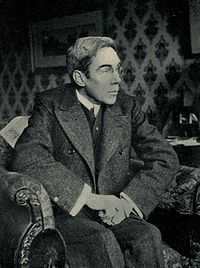Henry Harland

Henry Harland (1 March 1861 – 20 December 1905), novelist and editor, was born in Brooklyn and attended the City College of New York and for a short spell Harvard Divinity School. In May 1884, he married Aline Herminie Merriam, who shared his artistic interests.[1] His literary career falls into two distinct sections. During the first of these, writing under the pseudonym Sidney Luska, he produced a series of highly sensational novels, written with little regard to literary quality.
But in 1889 Harland moved to London and fell under the influence of the Aesthetic movement. He began writing under his own name and, in 1894, became the founding editor of The Yellow Book. The short story collections of this new period, A Latin Quarter Courtship (1889), Mademoiselle Miss (1893), Grey Roses (1895), and Comedies and Errors (1898), were praised by critics but had little general popularity. He finally achieved a wide readership with The Cardinal's Snuff-box (1900), which was followed by The Lady Paramount (1901) and My Friend Prospero (1903). His last novel, The Royal End (1909), was incomplete when he died. His wife finished it according to his notes.[2]
Harland died in 1905 at Sanremo, Italy, after a prolonged period of tuberculosis.
References
- ↑ Barbara Schmidt (2012). "Henry Harland (1861–1905). The Yellow Nineties Online
- ↑ Regina Randolph Jenkins (1914). "Henry Harland". The Catholic Encyclopedia, Vol. 16 (Index). New York: The Encyclopedia Press
- The Oxford Companion to American Literature. 6th Edition. Edited by James D. Hart, revised by Phillip W. Leininger. New York & Oxford: Oxford University Press, 1996. p. 271. ISBN 0-19-506548-4.
-
 This article incorporates text from a publication now in the public domain: Cousin, John William (1910). A Short Biographical Dictionary of English Literature. London: J. M. Dent & Sons. Wikisource
This article incorporates text from a publication now in the public domain: Cousin, John William (1910). A Short Biographical Dictionary of English Literature. London: J. M. Dent & Sons. Wikisource
- Foote, Stephanie. "Ethnic Plotting: Henry Harland and the Jewish Writer." American Literature. March 2003 (75:1): 119-140.
External links
| Wikisource has the text of the 1911 Encyclopædia Britannica article Harland, Henry. |
|